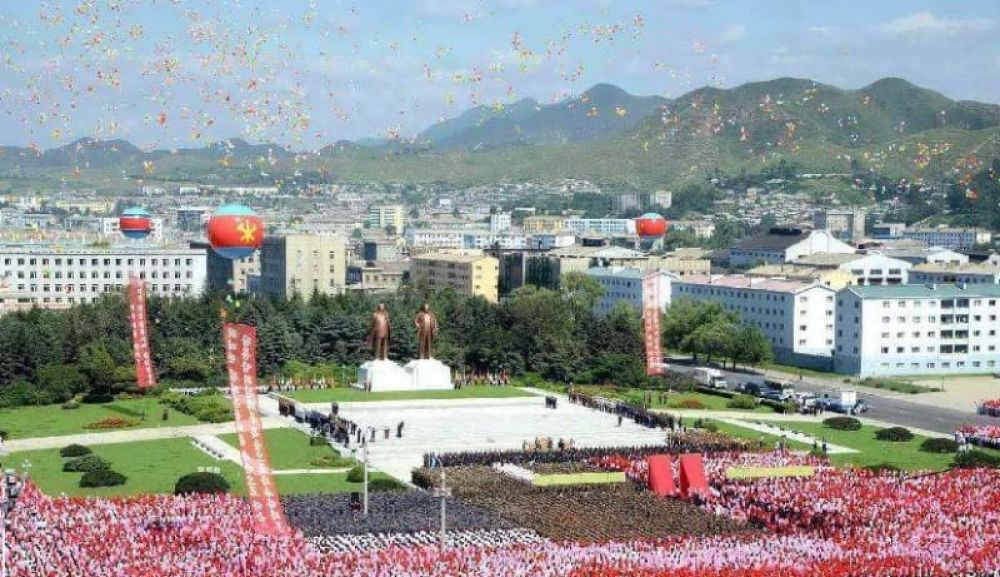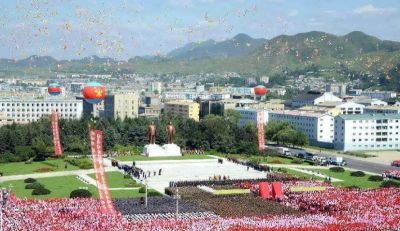

The Chongjin Revolutionary Museum is an important cultural institution in Chongjin, presenting the history of the revolutionary struggle in North Korea. Visitors to the museum can explore a wide range of exhibits and artifacts that chronicle the nation's fight for independence and the development of the Workers' Party of Korea. With detailed dioramas, historical documents, and personal effects of revolutionary figures, the museum offers a deep dive into the DPRK's past. Beyond the historical insights, the museum's architecture and the reverence with which the exhibits are presented offer a unique look into the values and narrative North Korea presents to its citizens and the few foreign visitors it receives.
Pohang Square is a significant place in Chongjin, hosting a monumental statue of Kim Il Sung, which is a focal point for locals and a symbolic site for state ceremonies and events. Visitors to the square can observe the grandiosity of the monument and the reverence it commands. The square is typically a place for locals to gather and is often a starting point for city tours. Around the square, tourists can take in the city's atmosphere, watch daily life unfold, and, if timing aligns, witness national celebrations or parades. Visitations are usually controlled and part of a guided tour, offering a unique and highly structured glance into North Korean life.
The Seaside Park in Chongjin offers visitors a rare chance to unwind and enjoy the coastal atmosphere of North Korea. The park is one of the few recreational areas open to foreigners, boasting scenic views of the Sea of Japan (East Sea) and the opportunity to observe locals engaging in leisure activities. Here, visitors can take leisurely strolls along the beachfront, witness families picnicking, or watch the sunset over the water. While the park experience may be peaceful, it is still regulated, ensuring that foreign visitors are accompanied by guides, which shapes the way in which the park is enjoyed.
The Chongjin Steel Works is notable for being one of the major industrial complexes in North Korea. As part of a carefully managed tour, visitors can observe the industrial prowess that Chongjin prides itself on. The tour of this large-scale steel production facility offers insights into the heavy industry which is a cornerstone of the North Korean economy. Although specific details and access to certain areas may be restricted, the guided visit nevertheless provides a glimpse into the work environment and some of the processes involved in steel manufacturing in the DPRK.
Dining in Chongjin allows visitors to sample local North Korean cuisine, which includes a variety of traditional dishes. In escorted visits to select eateries or food stalls, tourists can taste staples such as kimchi, cold noodles, rice dishes, and an array of side dishes. Emphasizing on small, local eateries provides a more intimate look into the culinary life of the city, albeit still within regulated boundaries. It's a chance to engage with North Korea's food culture and perhaps interact with chefs or vendors, offering insights into the more mundane and human side of life in the country.
The Chongjin Grand Theatre is an ornate cultural venue where visitors might have the opportunity to watch a performance of North Korean music or dance. Such performances are showcases of the country's artistic talents and involve elaborate costuming, instrumental music, and choreographed pieces that reflect the nation's cultural heritage and contemporary themes. While availability and access to shows can be unpredictable and require state approval, witnessing a performance offers a vibrant and curated glimpse into the DPRK's cultural expression and state-sanctioned artistry.
The Chongjin Botanical Garden is a peaceful retreat in the midst of the city, offering a collection of both native and exotic plants. Touring the gardens provides a sense of the country's natural beauty, with carefully maintained plant beds, greenhouses, and landscaped areas. Although the visit is managed and part of a guided tour, it allows visitors to leisurely walk among the flora and appreciate the dedication to botanical conservation and education present in Chongjin. The serene setting presents an opportunity to reflect on the country's relationship with its natural environment.
The Chongjin Foreign Language Bookstore offers a unique experience to glimpse into the kinds of literature and propaganda that are available to North Koreans and foreign visitors alike. Here, one can browse through various books, often including works by North Korean leaders, educational texts, and language guides. The store is also a place where visitors can purchase North Korean souvenirs, such as postcards, stamps, and pins. The content of the bookstore is heavily curated, and the shopping experience is unlike those found in other countries, providing insights into the cultural narrative promoted within the DPRK.
If your visit coincides with a local soccer match at the Chongjin City Stadium, it presents a chance to observe North Korean sports culture first-hand. The atmosphere at these matches can be lively, with local fans cheering on their teams, providing a unique communal experience. While there can be significant state oversight at public gatherings, attending a sports event can be one of the more relaxed ways to engage with the local population and sense their passions beyond political and ideological frameworks.
The Chongjin Cemetery of Revolutionary Martyrs is a somber yet significant landmark. It serves as a memorial for North Koreans who lost their lives in the struggle against Japanese occupation. Visiting the cemetery offers a moment of reflection and provides context to the DPRK's narrative of sacrifice and resilience. The immaculately kept grounds and monumental statues reinforce the veneration of these figures. The experience is a poignant reminder of the weight of history and the narratives that shape a nation's identity. Tourists are expected to show respect and deference during their visit, as this is a place of great national importance.
